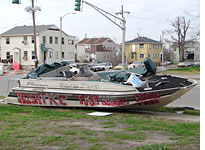An Economist Visits New Orleans
You would never guess that Xavier University in New Orleans sat under 8 feet of water. Sure, the student center is being gutted, and some of the grand Gothic Revival doors have searchers' spray paint still visible. But for the most part it looks like any other midsize Southern American university. The students, back from their semesters away, are gathered on the quads. The faculty members are back in the classroom and the laboratory. Energy is in the air. Yet the neighborhood across the street still lies in ruins.
In the realm of higher education, the cultural renewal of New Orleans is well under way. Unlike the city itself, New Orleans' universities are almost back to normal, with some creative adjustment. Dillard University, the worst hit, is teaching out of the Hilton on Poydras Street. Tulane will be running a second spring term starting in mid-May (dubbed, in local parlance, a "Lagniappe Semester") to keep students on track for graduation. Some Loyola faculty members are living in trailers on a university-owned lot in nearby Kenner. But classes are up and running, professors are researching and teaching, and a sense of normalcy dominates.
So why have the universities done so much better than the city as a whole? First, the universities were never wracked by extreme corruption and bad governance. They have continued to pursue success and avoided getting snarled up in questions about who is really in charge. New Orleans must deal with politically divided federal, state, and local governments, but the universities have clear administrative chains of command, starting with their boards and presidents.
The more definite lines of accountability and authority lead to clearer priorities. The universities are focusing on what economists call their comparative advantages—the things they do better than other institutions. Xavier, which produces more African-American pharmacists and med students than any other American university, is redirecting resources to the life sciences and pharmacology. Tulane is eliminating some engineering and doctoral programs and some NCAA sports, and refocusing on teaching. The Tulane administration called in outside experts for an evaluation and then made the necessary spending cuts. Few levels of government in the United States—much less the notoriously inefficient city government of New Orleans—can operate in such a fashion.
Despite these cuts, the universities are doing well by most measures of success. At Tulane, student applications for the 2006-07 freshman class have rebounded to roughly pre-Katrina levels, and most of the pre-Katrina students have returned. Donations are robust and growing. There have been student complaints about the cuts, but it is generally accepted that the school is back on its feet again and did well in a difficult situation.
The city, by contrast, has no sense of what must go and no vision of success. No leaders have articulated a vision for the city that balances the myriad competing local interests. The buck stops nowhere and many officials and citizens seem to wait for Washington to solve every problem. For any specific difficulty, the mayor blames Michael Brown, who blames Secretary Chertoff, who blames Gov. Blanco, who blames President Bush. Nobody is held accountable for failure to lead or failure to enforce the law and protect property rights. And as in any patronage system, a suggestion to cut failing programs is usually dead on arrival. The city sees spending money and delivering contracts to constituents (read: interest groups) as an end in itself.
Universities have also outpaced the city in using canny publicity to generate positive momentum for rebuilding. Xavier sent out surveys to see how many students were coming back and then announced the number, a very respectable 76 percent. In contrast, the city government has done little to help communities generate collective agreement to repopulate and rebuild neighborhoods. It is harder to court these returnees because the government cannot tell people, among other things, what building and insurance regulations they will be returning to, or where infrastructure will be rebuilt and to what extent.
Most importantly, the universities are cohesive communities in a way that New Orleans as a whole is not. The bonds between students, staff, faculty, former students, and the institution are palpable. As one Xavier student said, students would have come back this spring to "rebuild [the school] ourselves if we had to." Alumni have voluntarily contributed millions of dollars to the universities for rebuilding. In contrast, attitudes toward the New Orleans city government are usually those of extreme cynicism—attitudes that have only been amplified by the city's disarray during and after the hurricane.
To be sure, New Orleans higher education faces problems in the long run. For instance, if top faculty leave and future research stars do not take jobs at Tulane, the university might become a de facto teaching school over time. Of course, that would not be the end of the world. In the meantime the school has the status and clout of a research university (and an $800 million endowment), yet a student can receive the individualized attention they might find at a small teaching school. Fewer students and more focus bring significant benefits.
At least for the next few years, you can expect New Orleans schools to close up each time a fall storm approaches the city, whether or not the danger is large. But if nothing else, that means your son or daughter will visit home more often than otherwise, thereby solving an age-old parental problem.
So, should you send your daughter to Tulane? Absolutely. Just remind her that the renaissance ends at the edge of campus.
